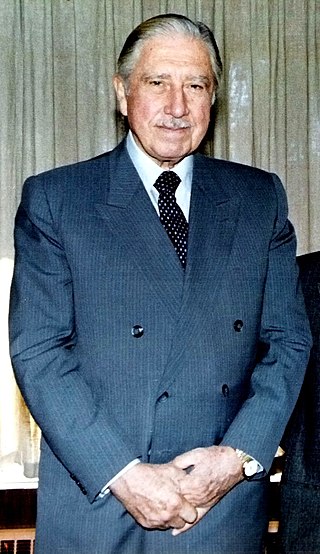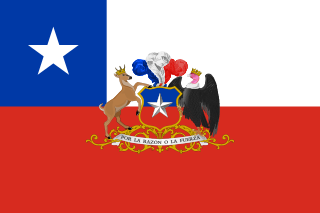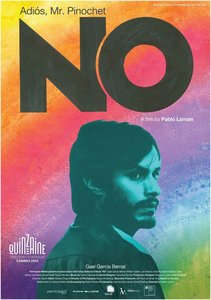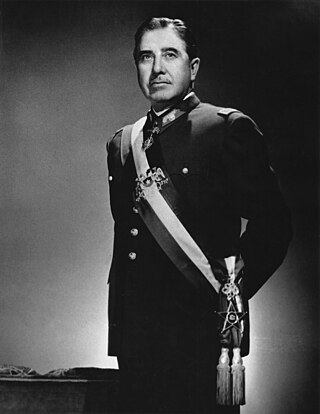This article needs additional citations for verification .(January 2020) |
| |||||
| Decades: | |||||
|---|---|---|---|---|---|
| See also: | |||||
The following lists events that happened during 1915 in Chile.
This article needs additional citations for verification .(January 2020) |
| |||||
| Decades: | |||||
|---|---|---|---|---|---|
| See also: | |||||
The following lists events that happened during 1915 in Chile.

An authoritarian military dictatorship ruled Chile for seventeen years, between 11 September 1973 and 11 March 1990. The dictatorship was established after the democratically elected socialist government of Salvador Allende was overthrown in a coup d'état backed by the United States on 11 September 1973. During this time, the country was ruled by a military junta headed by General Augusto Pinochet. The military used the breakdown of democracy and the economic crisis that took place during Allende's presidency to justify its seizure of power. The dictatorship presented its mission as a "national reconstruction". The coup was the result of multiple forces, including pressure from conservative groups, certain political parties, union strikes and other domestic unrest, as well as international factors.

Inés Lucía Pinochet Hiriart is the eldest daughter of former Chile's dictator Augusto Pinochet and Lucía Hiriart de Pinochet. She was a councilor for the municipality of Vitacura, from 2008 until 2012.

The Caravan of Death was a Chilean Army death squad that, following the Chilean coup of 1973, flew by helicopters from south to north of Chile between September 30 and October 22, 1973. During this foray, members of the squad ordered or personally carried out the execution of at least 75 individuals held in Army custody in certain garrisons. According to the NGO Memoria y Justicia, the squad killed 97 people: 26 in the South and 71 in the North.

A constitutional referendum was held in Chile on 11 September 1980. The proposed new constitution would replace the 1925 constitution, and was approved by over two-thirds of voters.

General Augusto Pinochet was indicted for human rights violations committed in his native Chile by Spanish magistrate Baltasar Garzón in 1998. He was arrested in London six days later and held on house arrest for a year and a half before being released by the British government in 2000. Authorised to return to Chile, Pinochet was subsequently indicted by judge Juan Guzmán Tapia and charged with several crimes. He died in 2006 without having been convicted. His arrest in London made the front pages of newspapers worldwide; not only did it involve the head of the military dictatorship that ruled Chile between 1973 and 1990, it marked the first time judges had applied the principle of universal jurisdiction, declaring themselves competent to judge crimes committed in a country by former heads of state, despite the existence of local amnesty laws.

On 11 March 1990, Chile the military regime of General Augusto Pinochet ended and was replaced by a democratically elected government. This transitional period lasted roughly two years although some processes may have lasted significantly longer. Unlike most democratic transitions led by either the elite or the people, this democratic transition process is known as an intermediate transition – a transition involving both the regime and the civil society. Throughout the transition, as the regime increased repressive violence, it simultaneously supported liberalization – progressively strengthening democratic institutions and gradually weakening that of the military.

The President of Chile, officially known as the President of the Republic of Chile, is the head of state and head of government of the Republic of Chile. The president is responsible for both government administration and state administration. Although its role and significance have changed over time, and its position and relations with other actors in the national political organization have also evolved, it remains one of the most prominent political offices in the country. It is also considered one of the key institutions that form the "Historic Constitution of Chile," and is crucial to the country's political stability.

Augusto José Ramón Pinochet Ugarte was a Chilean army officer and military dictator who ruled Chile from 1973 to 1990. He was the leader of the military junta from 1973 to 1981, and was declared President of the Republic by the junta in 1974 and thus became the dictator of Chile, and from 1981 to 1990 as de jure president after a new constitution which confirmed him in the office was approved by a referendum in 1980. His time in office remains the longest of any Chilean ruler.

No is a 2012 historical drama film directed by Pablo Larraín. The film is based on the unpublished stage play El plebiscito written by Antonio Skármeta. Mexican actor Gael García Bernal plays René, an in-demand advertising man working in Chile in the late 1980s. The film captures the advertising tactics in the political campaigns for the 1988 Chilean national plebiscite, when the citizenry decided whether or not dictator Augusto Pinochet should stay in power for another eight years. At the 85th Academy Awards, the film was nominated for the Best Foreign Language Film Oscar.
Events in the year 1974 in Chile.
The following lists events that happened during 1975 in Chile.
The following lists events that happened during 1976 in Chile.
The following lists events that happened during 1977 in Chile.
The following lists events that happened during 1980 in Chile.
The following lists events that happened during 1982 in Chile.
The following lists events that happened during 1983 in Chile.
The following lists events that happened during 1984 in Chile.
The following lists events that happened during 2006 in Chile.

Pinochetism is an authoritarian and personalistic political ideology rooted in the military dictatorship led in Chile between 1973 and 1990 by Augusto Pinochet. Ranging from the right-wing to the far-right, Pinochetism is characterised by its anti-communism, conservatism, militarism, and nationalism. Under Pinochet, Chile's economy was placed under the control of a group of Chilean economists known collectively as the Chicago Boys, whose policies have been described by some as neoliberal. Former and current supporters of the dictatorship are known as pinochetistas.
Events in the year 2021 in Chile.